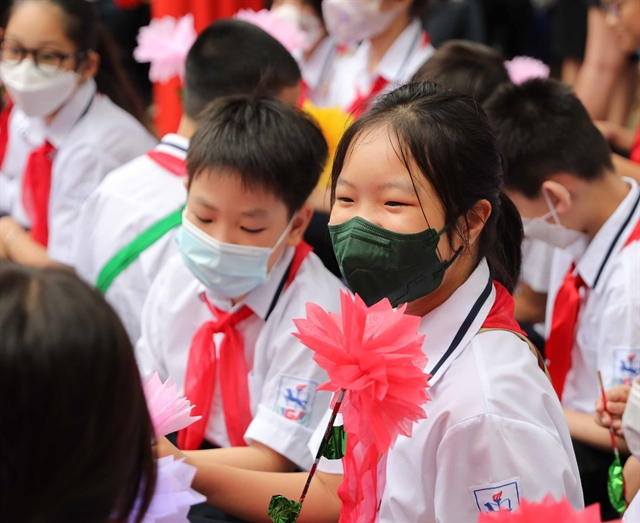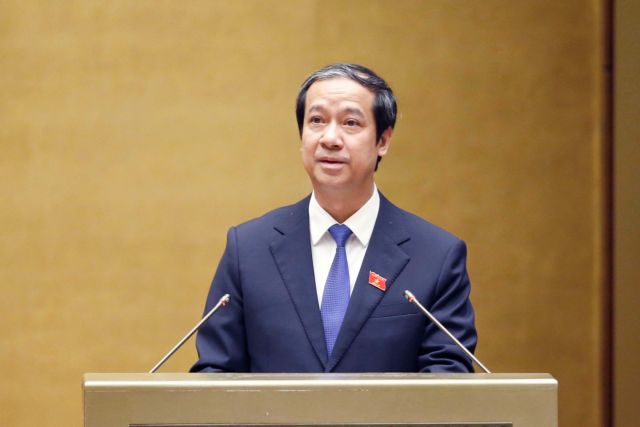.jfif) Opinion
Opinion

 |
| Students of Giảng Võ Secondary School in Hà Nội on the first day of the new school year on Monday. — VNA/VNS Photo Thanh Tùng |
Vietnam News Agency (VNA) spoke to Minister of Education and Training Nguyễn Kim Sơn on the sector’s efforts in renovation, as well as response to the current demands in terms of education and training.
As the new school year begins, what are the key missions of the education sector in 2022 - 2023?
Before speaking about the goals and missions of the new academic year, I want to mention the previous one - a very special school year. Due to the impact of COVID-19, schools were closed in most cities and provinces across the country. For an extended period of time, students had to study online, through television or other means. Then together we strived to reopen schools and bring children back to learning as normal. In a year full of hardship and challenges, the education sector has made tremendous efforts to complete the tasks set out and to persist with the quality goals.
Now as a new school year begins, the pandemic is basically under control. However, its challenges remain in the education sector. It is the impact of the pandemic on education quality, students’ health both physical and mental, skill training goals, as well as on many other aspects.
The key missions of the sector are stated in a directive on implementing the key missions of the school year in 2022-23. Stepping into the new academic year, one of our most important tasks is to continue enhancing students’ knowledge and provide support to those severely affected by the pandemic, those in difficult circumstances, and those whose parents died because of the disease. Psychological support, knowledge and skill enhancement are the major tasks in the education sector that need to be finished in the near future.
The 2022-23 school year is as an important year to implement education reform tasks at the general level, as well as the 2018 General Education Curriculum. That includes a new teaching plan for Grade 3, 7 and 10, reviewing Grade 4, 8 and 11 textbooks, and preparing to draft new textbooks for Grade 5, 9 and 12.
If we want to renovate the way we teach, learn and conduct evaluations, then first and foremost teachers need to constantly innovate and improve their own capacity in terms of both knowledge and pedagogical skills. Only when teachers innovate and transform themselves will education reforms be accomplished. In addition to this, it is necessary to provide accessible information to increase understanding and support from parents and society as a whole in this journey, otherwise, it would be very challenging. Therefore, a holistic approach is needed for successful reforms, in which the role and efforts of educators are exceptionally important.
Education reforms and implementation of the new general education curriculum are major missions with numerous challenges. It is required that we follow the schedule, however, the workload is huge and the current context is very challenging for implementation and quality. Therefore, achieving these goals requires comprehensive efforts from the whole sector, and rigorous coordination among ministries, departments and localities.
Meanwhile, other tasks such as universal preschool education, building a learning society, and developing financially-independent universities are advancing to the next phases, aiming toward elevated quality in higher education. These are the education missions for the new school year. The whole sector will also focus on other strategic goals, such as digital transformation in education and training, and building networks of universities and colleges.
 |
| Minister of Education and Training Nguyễn Kim Sơn. — VNA/VNS Photo Doãn Tấn |
Shortages of teachers is common in numerous localities executing the new general education programme. Despite the measures taken by the Politburo, recruitment of the teaching staff remains a challenge for cities and provinces. What are the solutions from the Ministry of Education and Training (MoET) to coordinate stakeholders and address this problem?
The MoET understands the challenges of teacher shortages during the implementation of the 2018 General Education Curriculum. The ministry has conducted consultations, proposed and taken measures to address this issue. One of these solutions was the coherent coordination with the Ministry of Home Affairs (MoHA) for additional recruitment for teachers.
In line with Decision No 72-QĐ/TW dated July 18, 2022, the Party Central Committee approved an additional 65,980 job vacancies for teachers in the 2022-26 period, of which 27,850 are for preschool and public school teachers for the 2022-23 period. Immediately following the Politburo’s decision, the MoET directed and guided localities to organise recruitment drives.
The MoET has required focus on solutions to ensure the sources of teachers such as widespread communication on vacancies, coordination with training facilities, and cooperation with other provinces to hold joint recruitments based on the subjects to meet the demand.
At the same time, a detailed review on the number of teachers needed based on grades and subjects will be continued until 2026, at which point a report will be submitted to the MoET and MoHA. This will be the basis to adjust the total additional number of teachers in 2026, according to Decision No 72-QĐ/TW, a move which ensures reasonable progress and structure that responds to the actual demands in localities.
In the long term, localities are also required to develop a roadmap for human resources training for the education sector, preparing for additional recruitment until 2026. They should also actively work with training facilities on the demands for teachers, and develop policies to ensure the sources for recruitment annually.
The MoET has also worked with the pedagogy training system and its schools, while support policies also show positive results. Enrolment for these schools is improving in terms of quality, and this will be one of the key solutions to the teacher shortage. However, for support policies in pedagogy training to become truly effective, stringent actions are required from ministries, departments and especially localities in managing supplies, recruitment and employment.
Tuition fees and costs have been a burning issue every school year. What are the measures taken by MoET to alleviate this financial burden for students and parents, especially in the difficult context following two years of COVID-19?
According to the Government’s Decree 81 on tuition fee collection and management for public education institutions, the 2022-23 school year will be the start of the roadmap to increase tuition fees, which responds to the aspiration for better teaching and learning quality.
However, the reality is that the past two years with COVID-19 have caused major impacts on people’s lives. Statistics on the income per capita in Q1, 2022 show that the average income of workers remains lower than the previous year. The MoET has submitted a roadmap for tuition fees to the Prime Minister. This proposal aims to provide prompt support for low-income students and households in difficult circumstances, stabilising prices and controlling inflation, contributing to economic recovery and stable life for the people.
To share the burden with parents, many localities have decided to keep, or even waive, their tuition fees at the general education level for the 2022-23 school year.
In addition to this policy, the Government has received a plan from the MoET, which asks to use the State budget to buy textbooks for students to borrow from this academic year. If implemented, this policy will also help ease the financial burden for students and parents, especially those underprivileged or living in remote areas.
For other expenses, the MoET has issued directions and guidelines to prevent “over-collection” at the beginning of the new school year. Most recently, in an official document sent to local departments of education and training on activity execution in 2022-23, the MoET required that these departments provide guidance to schools to strictly follow regulations on expenditure management and transparency as the new academic year begins.
What is your message to teachers, students and education staff for the new school year?
If the 2021-22 school year was about persevering with the quality goals and curriculum plan completion, this year is about consolidating, quality improvement and achieving renovation goals and missions.
The 2022-23 school year is positioned as the year of renovation, therefore, it is required that the whole sector strive harder, putting in more efforts to overcome the challenges of the renovation process, thereby responding to the expectations of society on education and training quality, and accomplished the tasks assigned by the State, the Party, the Government and the people.
As the new school year begins, I would like to send my well-wishes to all teachers, students and education staff across the country. I hope that this year will see many achievements and us together making efforts to bring the best results for the education sector in the future. — VNS




